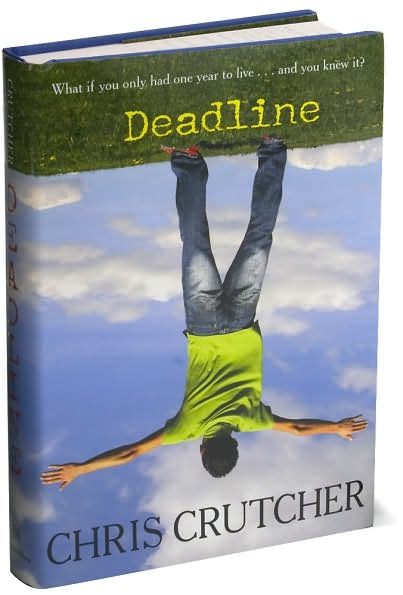Diversity and Realism Are Not Enemies: DEADLINE by Chris Crutcher

I just finished listening to Chris Crutcher’s Deadline, and doing so was both a pleasure (I’ve loved Chris Crutcher since listening to his fabulous Whale Talk) and a chance to think about the relationship between realism and diversity in YA.
But first, here’s the skinny on Deadline, courtesy of the Library of Congress (where I go for the best book summaries):
Ben Wolf has big things planned for his senior year. Had big things planned. Now what he has is some very bad news and only one year left to make his mark on the world.
How can a pint-sized, smart-ass seventeen-year-old do anything significant in the nowheresville of Trout, Idaho?
First, Ben makes sure that no one else knows what is going on—not his superstar quarterback brother, Cody, not his parents, not his coach, no one. Next, he decides to become the best 127-pound football player Trout High has ever seen; to give his close-minded civics teacher a daily migraine; and to help the local drunk clean up his act.
And then there’s Dallas Suzuki. Amazingly perfect, fascinating Dallas Suzuki, who may or may not give Ben the time of day. Really, she’s first on the list.
Living with a secret isn’t easy, though, and Ben’s resolve begins to crumble . . . especially when he realizes that he isn’t the only person in Trout with secrets.
Discounting the mention of Dallas Suzuki, you might be wondering where diversity would come into play in the white, white world of Trout, Idaho. And that’s what I love about this book: it’s true to its rural setting without giving up on the idea that diversity matters. Ben is white, as are almost all of the kids at his school and in his town. But—like my younger self growing up in rural East Texas—he cares about what’s happening in the rest of the world.
He’s fascinated by The Autobiography of Malcom X as well as Lies My Teacher Told Me, both of which influence him to discover the subtext of discrimination and prejudice in his hometown. (Without, by the way, ceasing to care deeply about the town and his neighbors.) BTW, I’m guessing that the cranky Kirkus reviewer who criticized “Crutcher’s heavy-handed lessons on the ills of racial prejudice and the need for gun control” read the good ole boy attitude of some of Trout’s citizens as exaggerated. I don’t think it was. And for the record, I’m from Kilgore, Texas, a town where the concentration of Republicans and guns is just about as heavy as it gets. (I still love you, East Texas.)
Now, there are many other things I enjoyed about Deadline, including Ben’s self-deprecating sense of humor and his dream conversations with a wise man who goes by Hey-Soos. (Yes, Ben’s therapist helpfully points out that Hey-Soos is phonetically identical to the Spanish pronunciation of Jesus.) They talk about free will, moral relativism, relationships, and how premarital sex can be healing for Dallas, who turns out to have survived sexual abuse. Fascinating stuff that leaves readers thinking.
So: the challenge of embracing a diverse world from a not-so-diverse corner of that world isn’t the focus of Deadline, but it is there. And it’s there in such a way that it never subverts the realism of Crutcher’s world.




